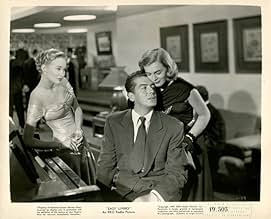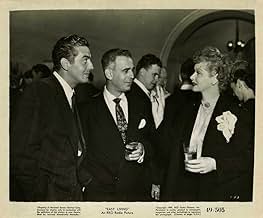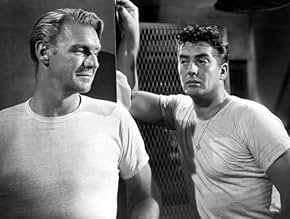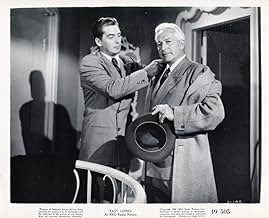IMDb RATING
6.3/10
1.1K
YOUR RATING
Star footballer Pete Wilson faces a career-threatening condition. His wife Liza enjoys the glamorous lifestyle, while shunning has-beens. His friend Tim retired to coach. Pete only knows foo... Read allStar footballer Pete Wilson faces a career-threatening condition. His wife Liza enjoys the glamorous lifestyle, while shunning has-beens. His friend Tim retired to coach. Pete only knows football.Star footballer Pete Wilson faces a career-threatening condition. His wife Liza enjoys the glamorous lifestyle, while shunning has-beens. His friend Tim retired to coach. Pete only knows football.
Richard Erdman
- Buddy Morgan
- (as Dick Erdman)
Jim Backus
- Dr. Franklin
- (as James Backus)
- Director
- Writers
- All cast & crew
- Production, box office & more at IMDbPro
Featured reviews
Pete Wilson, also known as King Football, faces a dual crisis. Diagnosed with a serious heart ailment, he learns his career is over. Wilson also must break the news to his star-struck wife, who enjoys the spotlight even more than he does.
"Easy Living" is of course an ironic title. Wilson's life, as a quarterback and as a husband, is anything but easy. As the story evolves, he must come to terms with both the loss of his livelihood and the possible end of his marriage. Victor Mature, who played gladiators both ancient and modern, does his best but he isn't quite up to the emotional demands of the role. And Lizabeth Scott, ever the ice princess, never comes across as Wilson's wife. The supporting cast, featuring Lloyd Nolan as the head coach and Lucille Ball as his son's widow, is generally stronger. Jack Paar, in one of his rare film roles, pops up as the team's PR man.
The film's climax, in which Wilson slaps his wife in desperation, could never be made today but still was acceptable in 1949. Frankly though, you can't help share Wilson's frustration with this frivolous woman and you have to wonder what you would do in his place.
Highly recommended, both as a study of mid-century social attitudes and for an early Hollywood view of the NFL
"Easy Living" is of course an ironic title. Wilson's life, as a quarterback and as a husband, is anything but easy. As the story evolves, he must come to terms with both the loss of his livelihood and the possible end of his marriage. Victor Mature, who played gladiators both ancient and modern, does his best but he isn't quite up to the emotional demands of the role. And Lizabeth Scott, ever the ice princess, never comes across as Wilson's wife. The supporting cast, featuring Lloyd Nolan as the head coach and Lucille Ball as his son's widow, is generally stronger. Jack Paar, in one of his rare film roles, pops up as the team's PR man.
The film's climax, in which Wilson slaps his wife in desperation, could never be made today but still was acceptable in 1949. Frankly though, you can't help share Wilson's frustration with this frivolous woman and you have to wonder what you would do in his place.
Highly recommended, both as a study of mid-century social attitudes and for an early Hollywood view of the NFL
Easy Living is not a light comedy, despite the presence of Lucille Ball, Jim Backus and Jack Paar. Neither is it really a sports movie, though it's set in the world of professional football. Irwin Shaw wrote the novel on which it's based the story of a man who's approaching midlife knowing nothing but how to play ball. The movie version proves surprisingly textured and involving, which ought not to be surprising, as the director is the ever resourceful Jacques Tourneur.
Victor Mature is a New York gridiron hero whose game is starting to slow down; in fact, he finds out he has a heart ailment which spells early death if he keeps on playing. But his quest for a cushy coaching job is handicapped by his ambitious wife (Lizabeth Scott). She's not cut out for the den-mother duties a coach's wife must shoulder, as she's trying to make a success of her interior design business despite her own handicap of commanding neither taste nor talent a handicap she overcomes by luring monied clients romantically. So in addition to his health and career crises, Mature faces a marital one as well.
The large cast includes Lloyd Nolan as the club's owner and Lucille Ball as his widowed daughter-in-law, who works for the team and nurtures a crush on Mature. Tourneur shows his craft in coaxing a subdued and touching performance from her; he surpasses that by drawing from Scott, especially in a self-pitying drunk scene, the only piece of real acting she ever committed to film.
Easy living ends too abruptly (it clocks in at only 78 minutes) but there's nary a false note or a slack stretch in it. Made near the peak of the noir cycle, which accounts for its minor-key tonality (the score, by the way, is by Roy Webb), it springs yet another surprise in being one of the first films to find a dark side in that American institution, professional football.
Victor Mature is a New York gridiron hero whose game is starting to slow down; in fact, he finds out he has a heart ailment which spells early death if he keeps on playing. But his quest for a cushy coaching job is handicapped by his ambitious wife (Lizabeth Scott). She's not cut out for the den-mother duties a coach's wife must shoulder, as she's trying to make a success of her interior design business despite her own handicap of commanding neither taste nor talent a handicap she overcomes by luring monied clients romantically. So in addition to his health and career crises, Mature faces a marital one as well.
The large cast includes Lloyd Nolan as the club's owner and Lucille Ball as his widowed daughter-in-law, who works for the team and nurtures a crush on Mature. Tourneur shows his craft in coaxing a subdued and touching performance from her; he surpasses that by drawing from Scott, especially in a self-pitying drunk scene, the only piece of real acting she ever committed to film.
Easy living ends too abruptly (it clocks in at only 78 minutes) but there's nary a false note or a slack stretch in it. Made near the peak of the noir cycle, which accounts for its minor-key tonality (the score, by the way, is by Roy Webb), it springs yet another surprise in being one of the first films to find a dark side in that American institution, professional football.
There are two stories here. The stronger one deals with a quarterback for the New York Chiefs pushed toward retirement by a heart murmur. This story offers interesting glimpses at the state of professional football, circa 1949. The team takes the train to "away" games, for instance, and it seems to have only one black player. And get this --making the Championship Playoffs means at least an extra $1000 for every man on the team! (But this was in an era of nickel pay-phone calls, when college football coaches made $3200 a year.)
The other story centers on the quarterback's troubled relationship with his ambitious, social-climbing wife who's not above using her seductive charm to make a success of her interior decorating business. Here again there are intriguing insights into the world of 1949, where "uppity" women had to be taken down a notch or two lest they forget their proper roles as wives and mothers.
These two stories don't merge particularly well, resulting in an awkward blend of "locker room" and "Park Avenue," and the ending seems forced and unconvincing. (This may have been due to the Production Code's dim view of divorce.) However, the cast still makes the movie worth a look, with solid work from Lucille Ball, Lloyd Nolan, Jim Backus, Art Baker, Jack Paar, etc. Lizabeth Scott -- she of the spectacular eyebrows -- seems a tad "overheated" as the self-centered wife but the script probably forced this kind of performance. Victor Mature has the better part and he acquits himself in adequate fashion. In his locker room scene he gets to strip off his shirt and thus reveal one of the great torsos in the movies. (And how gloriously it was soon to be whipped and otherwise tortured in such films as "Samson and Delilah," "The Robe," "Zarak," and "Timbuktu.") Too bad the movie as a whole isn't equal to its star's chest measurement.
The other story centers on the quarterback's troubled relationship with his ambitious, social-climbing wife who's not above using her seductive charm to make a success of her interior decorating business. Here again there are intriguing insights into the world of 1949, where "uppity" women had to be taken down a notch or two lest they forget their proper roles as wives and mothers.
These two stories don't merge particularly well, resulting in an awkward blend of "locker room" and "Park Avenue," and the ending seems forced and unconvincing. (This may have been due to the Production Code's dim view of divorce.) However, the cast still makes the movie worth a look, with solid work from Lucille Ball, Lloyd Nolan, Jim Backus, Art Baker, Jack Paar, etc. Lizabeth Scott -- she of the spectacular eyebrows -- seems a tad "overheated" as the self-centered wife but the script probably forced this kind of performance. Victor Mature has the better part and he acquits himself in adequate fashion. In his locker room scene he gets to strip off his shirt and thus reveal one of the great torsos in the movies. (And how gloriously it was soon to be whipped and otherwise tortured in such films as "Samson and Delilah," "The Robe," "Zarak," and "Timbuktu.") Too bad the movie as a whole isn't equal to its star's chest measurement.
It is difficult to determine where this story is set -- period. The sports team in "Easy Living" is the Chiefs, the helmets worn by this teams are those of the Rams, but yet this team (and ultimately, this story) is based in New York City.
Well, the Kansas City Chiefs began as the Dallas Texans and never existed as a franchise in New York City. The St. Louis Rams, and their iconic ram horn helmet design, has only been seen in three markets, Cleveland, Los Angeles and St. Louis. Again, a club that was never in New York City.
It is also more than odd that the main character, a quarterback, wears number 66, not a customary number for a quarterback to wear. But, it is this lack of accurate detailing that reveals a project mired in vagaries.
These type of historical inaccuracies reveal a more deep-seated lack of focus from this film. Despite its promise, Easy Living just lacks any type of focus. The plot slides around seemingly unsure of where it wants to go or needs to go. primarily, the essential points in the plot development are buried behind a lot of pointless distractions...and characters.
This perpetually 'out-of-focus' plot is enhanced by dialog which is trite, and contrived. It seems the writers of this screenplay were hellbent on being melodramatic and vague.
The movie seems to starts somewhere in the middle. Unfortunately, Easy Living runs like a stage play that is missing too many essential scenes, not just the beginning!
Well, the Kansas City Chiefs began as the Dallas Texans and never existed as a franchise in New York City. The St. Louis Rams, and their iconic ram horn helmet design, has only been seen in three markets, Cleveland, Los Angeles and St. Louis. Again, a club that was never in New York City.
It is also more than odd that the main character, a quarterback, wears number 66, not a customary number for a quarterback to wear. But, it is this lack of accurate detailing that reveals a project mired in vagaries.
These type of historical inaccuracies reveal a more deep-seated lack of focus from this film. Despite its promise, Easy Living just lacks any type of focus. The plot slides around seemingly unsure of where it wants to go or needs to go. primarily, the essential points in the plot development are buried behind a lot of pointless distractions...and characters.
This perpetually 'out-of-focus' plot is enhanced by dialog which is trite, and contrived. It seems the writers of this screenplay were hellbent on being melodramatic and vague.
The movie seems to starts somewhere in the middle. Unfortunately, Easy Living runs like a stage play that is missing too many essential scenes, not just the beginning!
Victor Mature, dour as always, is a pro football player. He ought to have hung it up long ago, and he knows it. He is married to Lizabeth Scott. Scott is very ambitious. Of course, today her ambition would seem quite logical. In 1949, it was still a little unusual for a woman not to be content with hubby's income and prestige.
These two are an odd pair. That's an aside, having little to do with whether or not the movie works -- and I do think it does.
Lloyd Nolan is excellent as the coach. Lucille Ball gives a subdued performance as his secretary.
Almost no one in this movie has what or who he or she wants. A gloom hangs over it.
Jacques Tourneur was an excellent director. This isn't his best. But I have a feeling it was a bit of a challenge for him -- a very all-American setting and plot. And he brings it off beautifully.
These two are an odd pair. That's an aside, having little to do with whether or not the movie works -- and I do think it does.
Lloyd Nolan is excellent as the coach. Lucille Ball gives a subdued performance as his secretary.
Almost no one in this movie has what or who he or she wants. A gloom hangs over it.
Jacques Tourneur was an excellent director. This isn't his best. But I have a feeling it was a bit of a challenge for him -- a very all-American setting and plot. And he brings it off beautifully.
Did you know
- TriviaThe white football seen in the warm-ups for the night game at the end of the film was used in the NFL for such games from 1929 to 1955. It was considered to be more visible to the players and fans than the typical brown football. By 1956 better stadium lighting, especially needed for television, made the white football obsolete.
- GoofsThough the team's name is the Chiefs, their helmets have horns on them like the NFL's Los Angeles Rams.
- ConnectionsFeatured in After the Fox (1966)
- How long is Easy Living?Powered by Alexa
Details
- Runtime
- 1h 17m(77 min)
- Color
- Aspect ratio
- 1.37 : 1
Contribute to this page
Suggest an edit or add missing content






































